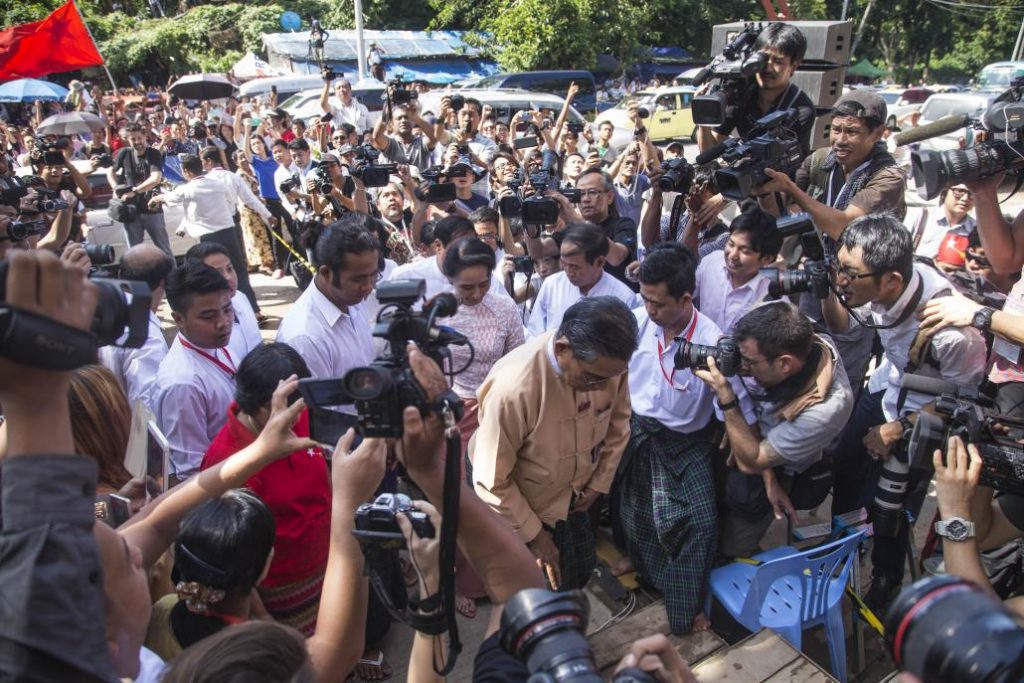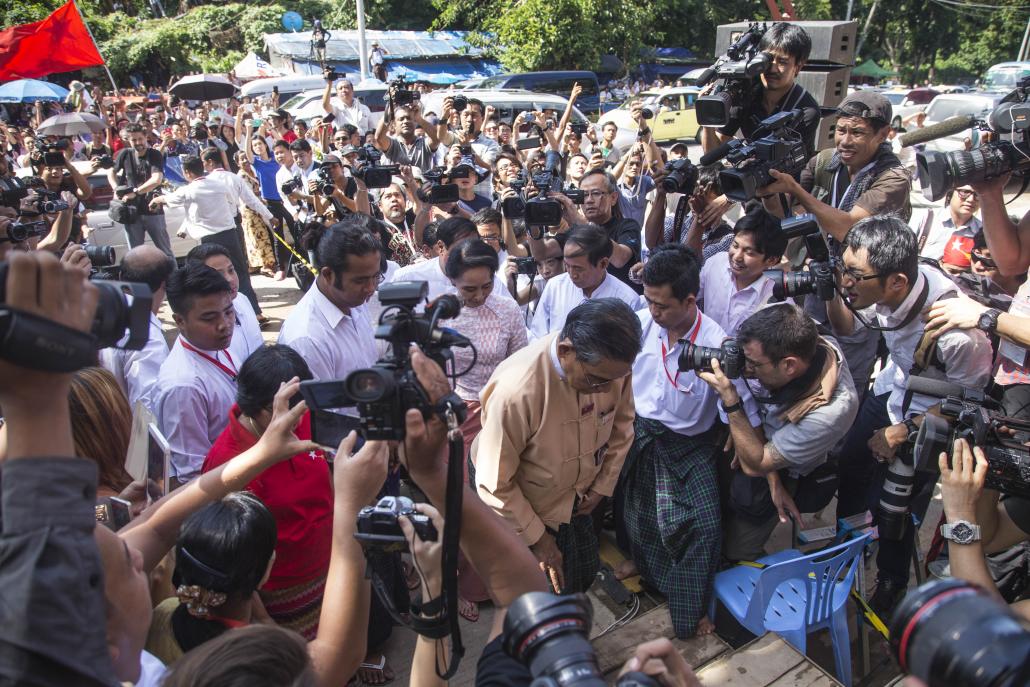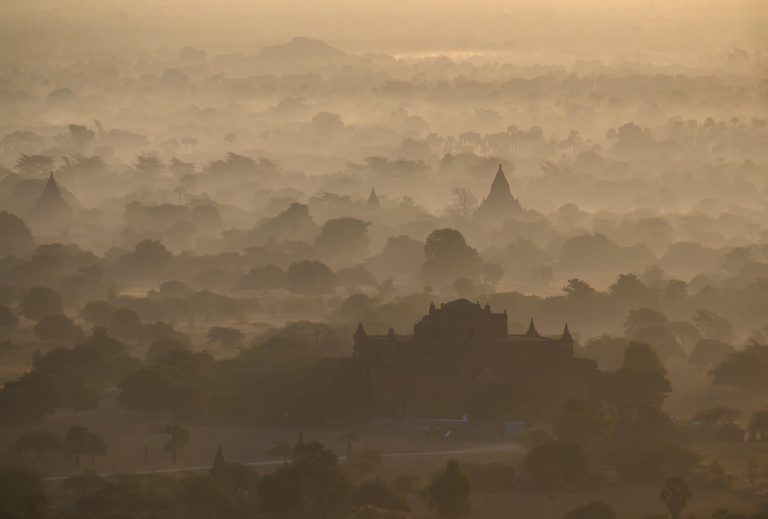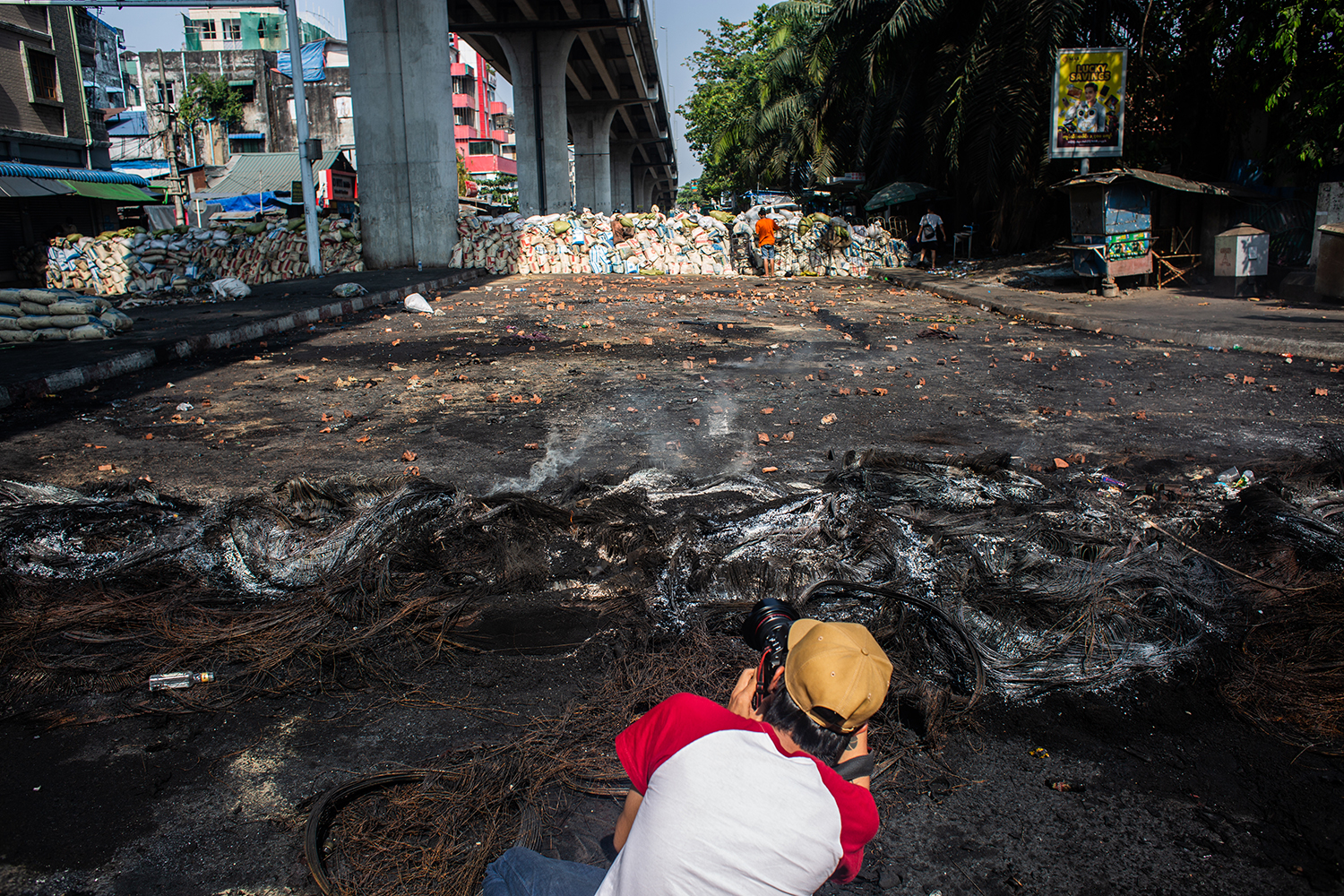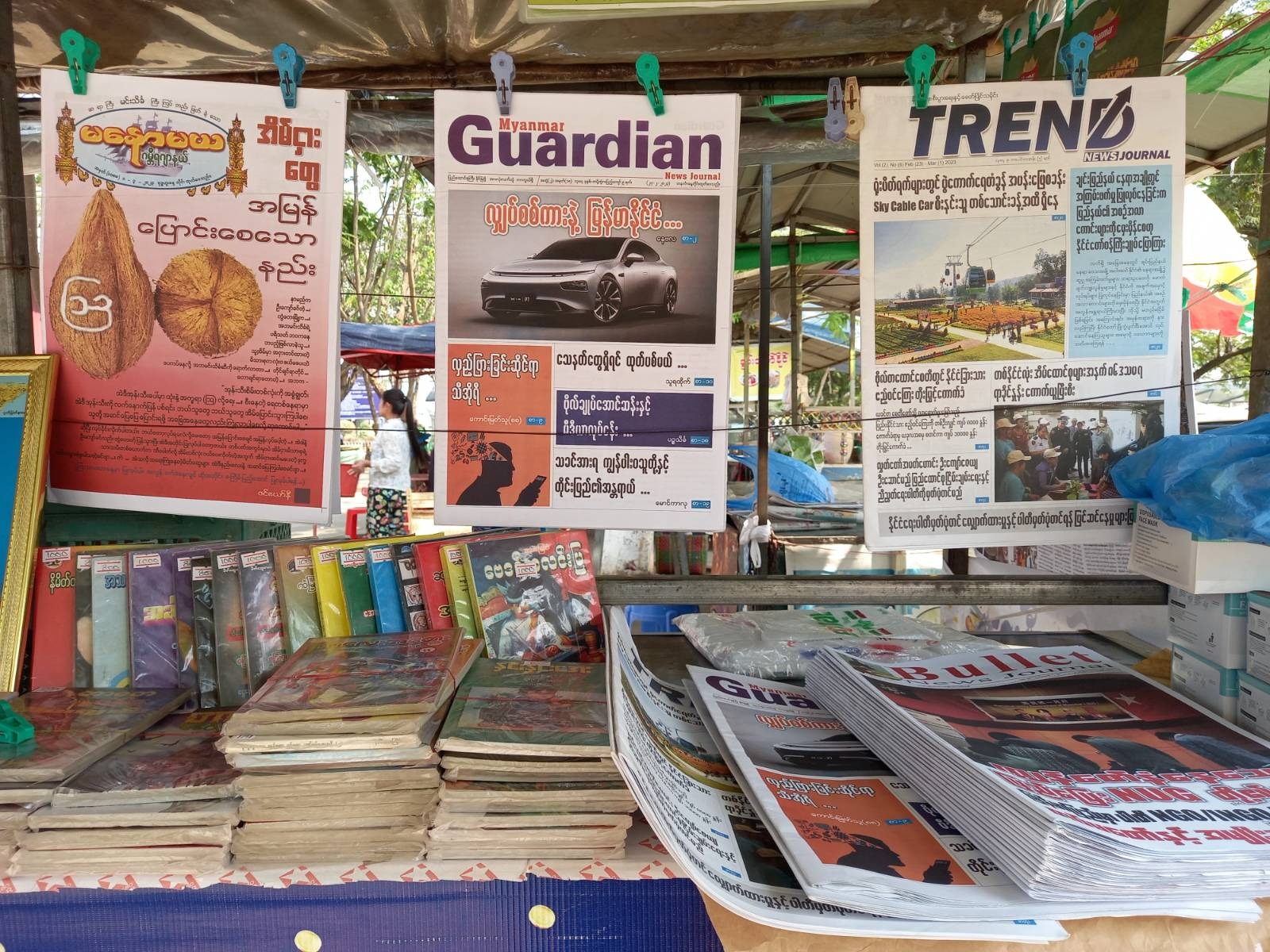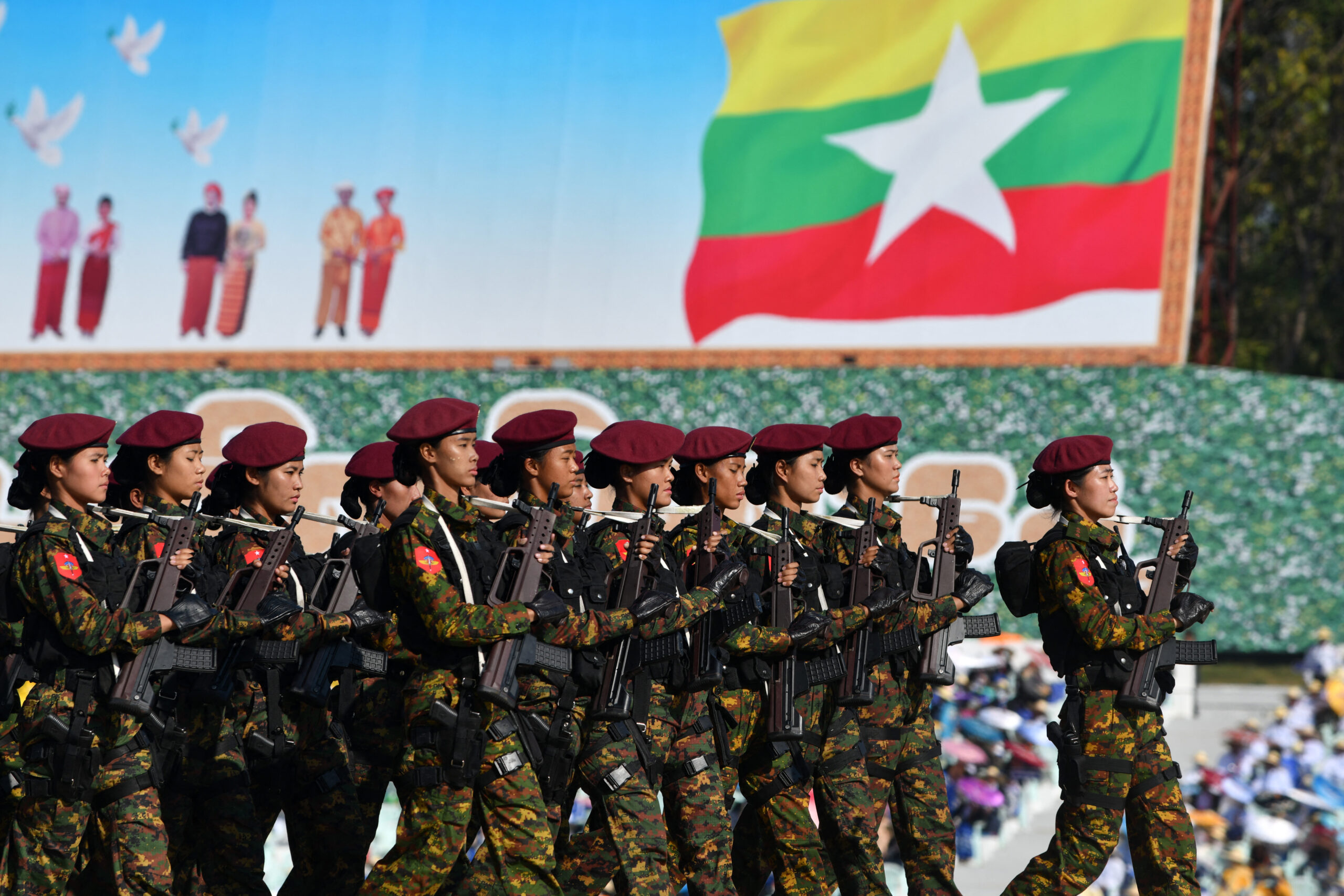Reporters crane to get a photograph of National League for Democracy leader Daw Aung San Suu Kyi. (Ann Wang / Frontier)
The opening of the country’s first schools of journalism last year is helping to raise professional standards in the nation’s newsrooms.
It has been two years since Unity Journal published a report claiming that the military was producing chemical weapons at a factory in Magway Region. The report was denied by the government and the journal’s chief executive officer and four reporters were charged with breaching the colonial-era Official Secrets Act and sentenced to 10 years in jail with hard labour, later reduced on appeal to seven years. One of the “Unity Five”, as they became known, had been on the job only a few weeks and did little but transcribe notes, his family said. The journal soon folded.
“It was a mistake. A pure mistake,” said veteran journalist U Thiha Saw, who has more than 30 years experience in the industry.
He thinks the report was absurd, but so was the prison sentence. The reporters were young and eager for a scoop. The editors wanted a headline that would sell copies. As for the military, it was just responding in the only way it knew how.
The whole situation, he said, was the symptom of an industry that had gone from dictatorship to relative media freedom at a breathless pace, and everyone was struggling to catch up.
“With the sudden lift of censorship, everyone seemed to say, ‘Hey, now we can write whatever we like,” he said, referring to the lifting of pre-publication censorship in August 2012. “Now is the time when we suddenly need more training towards professionalism, a code of ethics, code of conduct.”
Support more independent journalism like this. Sign up to be a Frontier member.
U Thiha Saw sits on the Myanmar Press Council and directs the Myanmar Journalism Institute, two projects intended to help strengthen the capacity and professionalism of the media. The newspaperman spent his career fighting for some of the freedoms journalists have gained in the last five years. But with a new generation of serious and motivated reporters and the decision to allow private sector daily newspapers in early 2013, came a rash of journals rife with dubious sources, stolen photos and made-up quotes. Most reporters are good-natured, but lack training and a strong culture of journalism.
Change isn’t waiting for them to catch up. The recently-passed Television and Broadcasting Law and Printing and Publishing Enterprise Law will soon open the door for new opportunities to tell the news – and also new ways to break the rules.
A culture of outcasts
The founding fathers of Myanmar media were an ensemble of bureaucrats, generals, businessmen and political exiles, each with an agenda and few who were really journalists at heart.
“The problem is not only the young journalists. Old journalists need training,” said Eric Glover, who began working in Myanmar for Canal France International, a French media development organisation, around the time of the Unity Journal case. “We are in a country where even people considered good journalists are – most of them, not all of them – still very far from even an average international standard.”
Myanmar is at a curious point in history as dictatorships go, Mr Glover said. Rather than groom the media into a propaganda machine, it simply left it alone.
“In Russia you had the Pravda, but you still needed people for the layout and you still needed people to know what kind of propaganda you wanted to conduct. Here, they did not care,” he said. “There was no training centre for journalists because there was no need of journalists.”
People bought the state-run papers because they published obituaries and weather forecasts, and editors were often bureaucrats shunted from some other public office. In the 1990s the government began granting licences for private weekly journals, but they were confined to harmless topics such as business, sport and entertainment.
The only serious reporting was carried out in exile. U Sein Win helped found Mizzima News, which was launched in India in 1998. He talks about using software to translate his articles into Spanish before emailing them abroad. For years, the only political journalism came in this way: smuggled out of internet cafes or beamed in on shortwave radio broadcasts.
But these were more activists than reporters, and today’s Fourth Estate has the same DNA. Journalists aren’t necessarily primed to think objectively, but to lash out against the status quo; to slip past censors, not verify their own intel. Now that official censorship is a thing of the past, journalism as an industry is struggling to find a new modus operandi.
Building an institution
The old censorship board, the Press Scrutiny and Registration Division of the Ministry of Information, was stifling, but at least it was safe.
“Censorship was effectively a check on what journalists were doing. You would never get in trouble for sending something to the censorship board,” said Thomas Kean, who edits the English edition of the Myanmar Times. “I think in a way journalists weren’t taking responsibility for their work.”
Today the government can’t simply thumb through publications and axe content at will, but it can still hit journalists with heavy and, some argue, heavy-handed penalties, thanks to complex net of old and ambiguous media laws, which it used in the Unity case.
The Myanmar Press Council was designed to be a safety net between practising journalists and the wrath of the government, said U Thiha Saw. The council recently published a standard Code of Conduct that includes advice on interview etiquette, what sources to trust, and when to identify someone’s race and religion – basic practices for international media that have never been laid out in Myanmar.
U Thiha Saw mentioned a recent case in which a Yangon editor downloaded and published photos from another journalist based in Shan State. “That’s outright violations of copyright. [The editor] had been working more than ten years,” he said. “Even now, the majority of people don’t know these things. They never knew these things.”
Journalism has traditionally been a learn-on-the-job vocation, but two journalism schools opened in 2014. One is at the government’s National Management College and the other is run by the Myanmar Journalism Institute, a collaboration among the government, UNESCO and several other international organisations. MJI is offering some the country’s first and only independent training programs for young journalists, including full and part-time courses and a five-week working internship program.
The training is discussion-intensive and requires students to propose their own story ideas. U Sein Win said it teaches the future reporters how to approach stories creatively and think critically about the information presented to them, concepts that they find extremely difficult to grasp.
“Here [in Myanmar] it is teacher-oriented education,” he said. “You don’t train the student to research for themselves. That is one of the weakness. [MJI] has kind of a revolution. Our teaching system is about interaction…We bring them into the discussions, arguing, debating.”
Ma Shwe Paw Mya Tin, a full time student, transferred to MJI after a year at the National Management College. She said the government program was largely theoretical, explaining the roles and forms of media, in contrast to MJI’s self-directed learning. She said learning to do her own research and approach her own sources made a positive difference to her internship at The Voice.
“Every day I would discuss with the editors about what I was doing, what interviews I had that day,” Ma Shwe Paw Mya Tin said. “My first news, I wrote about MNHRC, that is the Myanmar National Human Rights Commission. It was on the cover, and this was my first news from the internship. I was so happy.”
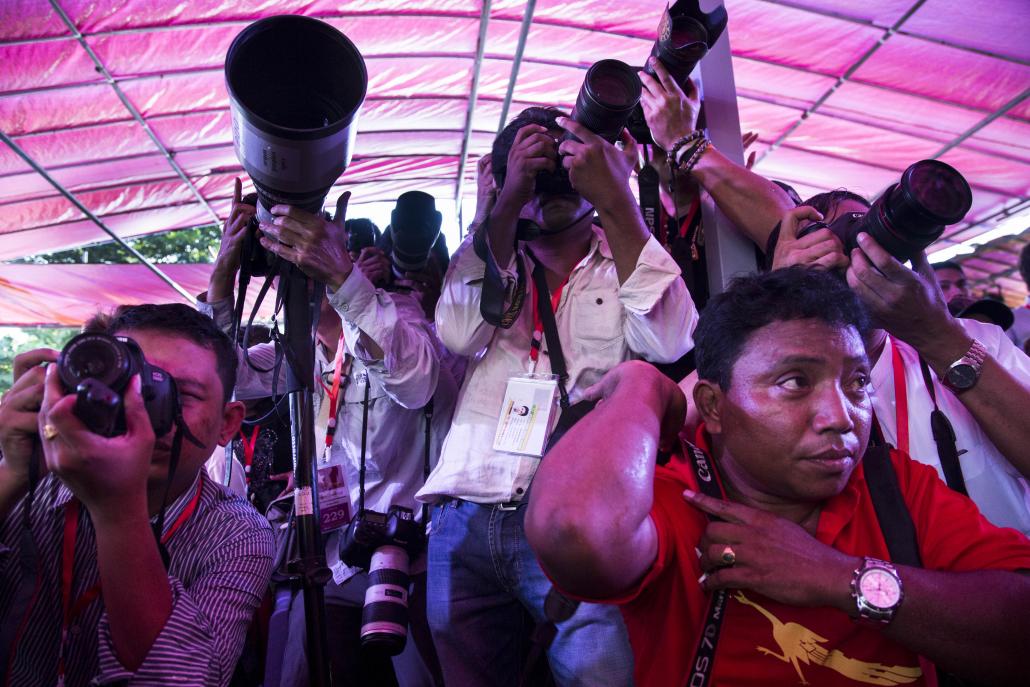
Reporters at the Yangon home of Daw Aung San Suu Kyi. (Ann Wang / Frontier)
Industry standard
Ma Shwe Paw Mya Tin will be a superior entry-level journalist when she graduates, U Sein Win boasted. Who will be able to afford her, however, remains to be seen.
“A lot of our guys are making half what they can get in [other fields],” said Mr Kean.
“I admire them for making that decision.”
Media, especially print media, is struggling. Many of the dailies launched after the 2013 Media Law was passed have closed and survivors, even big papers such as 7 Day News and Daily Eleven, are usually floated by the publishers’ weekly or monthly publications.
Candidates with strong analysis and communication skills, and especially those who can speak English, are often taken by higher paying NGOs and public relations firms, Mr Kean said. Those who do stay are usually sent straight into the field.
“One of the Unity reporters who was arrested had been on the job something like three weeks,” Mr Kean said.
The Myanmar Times has the resources for effective training, but it is the exception, said Mr Kean, and many publications don’t have the manpower to thoroughly research and vet their findings. Mr Kean, who was trained in Australia, said the Times has instilled high reporting standards, but it can take new hires some time to get used to them.
“The feedback I get from our reporters is that some of the articles published elsewhere are ones that, as editors, we would reject outright,” he said. “Some come from smaller publications and can be surprised and flummoxed by the things we ask them to do.”
It takes a village
Where the government can be heavy handed against perceived slights, the public is perhaps too forgiving, Mr Kean said.
“Readers from what I can tell don’t seem to mind too much if they find out later something that they read wasn’t true, at least in the mass market,” he said.
U Thiha Saw agrees. He claimed the demand for sensationalist, tabloid journalism is at least as high as legitimate news, and one of the biggest challenges for media development is that there is no clear boundary between serious reporting and sensationalist tripe.
Thus, almost as important as building standards among reporters is establishing what U Thiha Saw calls “media literacy” among the reading public.
“One thing we learned in Myanmar is that people trust mostly people,” said Mikel Aguerre Idiaquez, a media development specialist for UNESCO. “They trust more what their friend tells them on Facebook or what their neighbour tells them.”
People have historically not trusted the government, he said, and by extension, the media. They read the news, but put as much stock in social media. They don’t necessarily trust tabloid fodder, but will still feed it into the rumour mill.
Several development groups, including the Myanmar Institute of Theology, are conducting workshops and public information campaigns, and one UNESCO programme helps rural communities develop their own newly legal radio stations. They provide technical resources and training, but also “explain the concepts of community media,” Mr Idiaquez said. “The community has to work well as one voice.”
Youth and passion
The Myanmar Times has ended its three-month training program, not because it doesn’t have the resources, said Mr Kean, but because it is able to recruit experienced reporters, some of whom are refugees from publications that folded as the print media bubble deflates.
In this way, that papers are dying is helping to create Myanmar’s journalism culture, Mr Kean said. Only the best publications are surviving, and are beginning to shelter the best talent, and the most passionate. He said the Myanmar Times newsroom has a lower turnover these days even though competing job opportunities have never been better.
“They could get higher paying jobs now, but a lot of them choose to not take those opportunities, they choose to stay with us, to keep working as journalists,” he said. “I think that’s been an important change, this newfound sense of purpose.”
U Thiha Saw only hopes that sense of purpose will override the allure of cheap, sensationalist stories, the kind too many journalists are able to get away with, until, in the case of the Unity Five, they don’t.
“This is something I am really concerned about,” he said.
“We’re trying to push through these young journalists that ‘You need to know where you want to go. You want to go for a high circulation, it’s your choice. But if you want to be a really serious journalist, these are your choices.”


